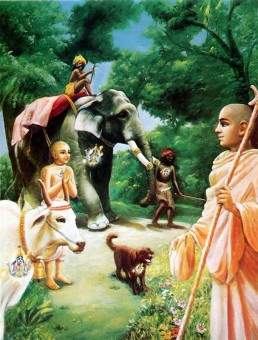Krishna himself feels that his over-enthusiastic description of the Perfect-man and his mental life may give to any reader a despairing sense of impossibility or futility. No one living the present life of agitations, can ever dare to hope that such a perfect happiness is ever possible for a mortal living upon this ever-spinning globe. If a philosophy is only an idealism which has no contact with the practical world, that philosophy is merely Utopian poetry fit for entertaining a pleasant idea, but never capable of making man a nobler being.
In order to remove that misunderstanding, Krishna, in this stanza, gives the assurance that man is capable of living that perfect joy in this VERY WORLD, if only he makes the necessary adjustments in himself.
My great-grandfather was a great violinist. His violin was preserved and worshipped in my house till now. I too have gained now a preliminary nodding acquaintance with music. Suddenly an idea struck me: “Why not take my great-grandfather’s instrument and play upon it and thus become overnight a great musician?” If I play directly upon that ancient and faithful instrument, I will be forced to break it into pieces, for, that violin, in that condition, cannot give me perfect music. It needs general cleaning and dusting; perhaps, re-stringing and a lot of tuning up. When these adjustments are made, then only can it faithfully give out all the notes, implicitly obeying the strokes of my bow and the ticklings of my finger. In the same fashion, today, our mind and intellect, the instruments of singing the song of Perfection, neglected from beginningless time, need a lot of re-adjustments before they can gurgle out their contents of laughter and joy.
The technique of re-adjusting the inner-instruments is beautifully summarised here by Lord Krishna. The very brevity and simplicity of this verse are the obstacles to our understanding its full import. The advice has a deceptive look of simplicity. “WITHSTAND THE IMPULSE OF DESIRE AND ANGER,” then he is a Yogi, even while here, before his death, the happy man. To a modern student of Freud and others, soaked with the ideas of behaviourism and such other modern superficialities of psychology, this may look rather an unscientific expression of a crude enthusiast. But when we analyse and try to grapple with its full import and implication, we shall see that it contains volumes of suggestions.
“Desire” is the avalanche of thoughts sweeping down from the pinnacles of our intellect, along the valleys of our heart, towards an object-of-desire in the outer world. When this avalanche of thought is barricaded on its sweep by a substantial obstacle ere it reaches it destination, the blast with which it shatters itself on that obstacle is called “anger.” It is these two types of thoughts that generally agitate our bosom. The greater the desire with which we ponder over an object, the greater shall be the anger against any obstacle that comes between us and our object-of-desire.
To one who has won over joy and grief, and who has gained a certain amount of detachment from external objects, desire for obtaining the pleasant or the unpleasant is no emotion at all. Where there is no desire, hatred is an unknown alien factor there. He who has gained over these two impulses, powerful and almost irresistible as they are, is he who can afford to live in this world of multiplicity and imperfections as an independent solitary man of true and steady happiness.
Thus Krishna assures Arjuna — and through Arjuna all others like us who will read and try to understand this immortal scripture — that man can live perfectly happily even while in this form, among these very objects, in this very world, during this very life, if only he, in his spiritual evolution, learns to renounce his impulses of desire and hatred.
WHAT SORT OF A MAN RESTING IN BRAHMAN, ATTAINS BRAHMAN?… THE LORD SAYS:

